You can now add Healthify as a preferred source on Google. Click here to see us when you search Google.
Water
How much do I need to drink each day?
Key points about drinking water
- Not drinking enough water can affect our health – and not in a good way!
- Some water is made by our body, but we need the water from what we eat and drink to make sure we get enough.
- Water is involved in many processes in our body to keep it functioning well.
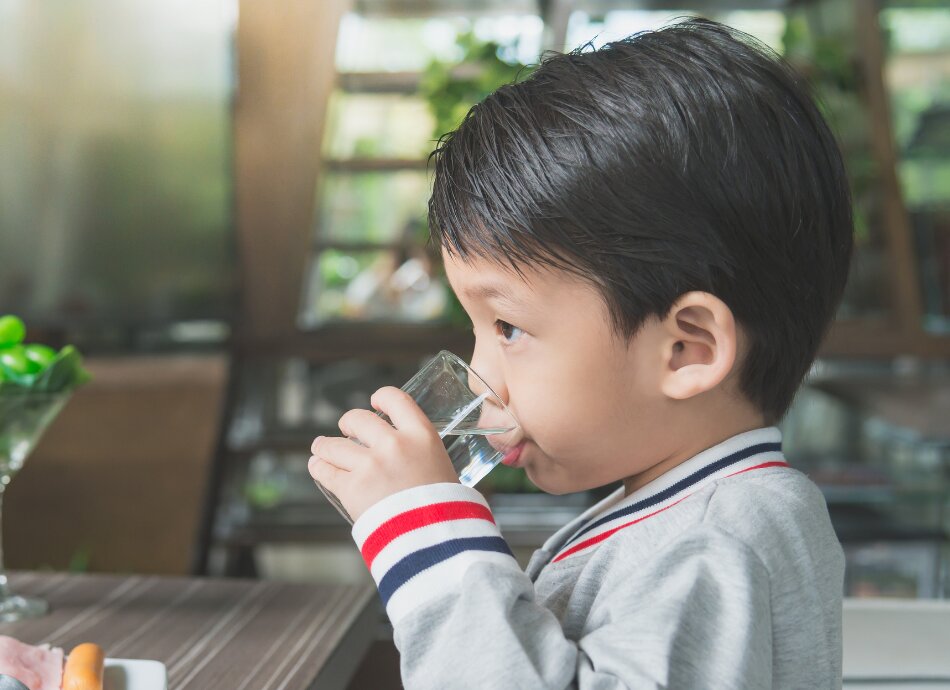
Your body is about 50–80% water, depending on your age and body weight. Water is involved in many processes in our body, including digestion, absorption, transportation, dissolving nutrients, temperature regulation and getting rid of waste products.
Did you know?
The average person can survive for about 40 days without food but most people will die if they go for more than 5 days without water.
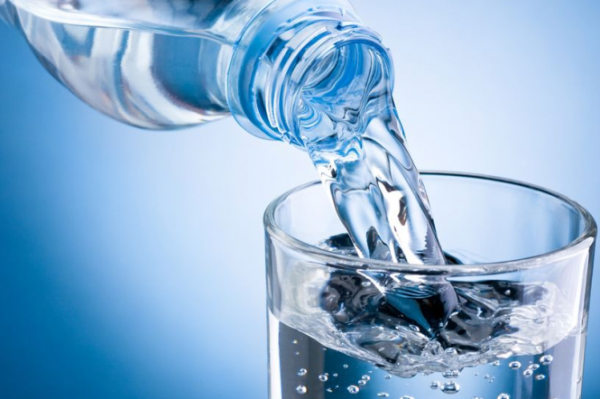
Image credit: 123rf
If your body's getting low on water, it has a clever way of telling you. You feel thirsty! It is important not to ignore your thirst, even if it is only mild.
Your body fluids become more concentrated (thicker) when you're low on water. This signals your brain to make you feel thirsty, and your kidneys to conserve water.
A 2% rise in the thickness of your blood can make you feel thirsty. When you reach a 5% increase in thickness, that's when you're dehydrated.
Most healthy people can rely on thirst to tell them when they need to drink more. However, there are exceptions to this:
- Older adults have fewer water reserves, and their sense of thirst is less reliable.
- Young children can dehydrate quickly. They often can't tell you that they're thirsty, nor can they get a drink for themselves.
- Older adults and young children should drink often, even if they are not thirsty.
To keep functioning normally, your body needs a steady supply of water. You lose water through sweat, breathing and going to the toilet. So exercise, playing sports, hot weather, vomiting (being sick) or having diarrhoea (runny poo) can change how much water you need.
Did you know it's not just water that counts?
Water (fluid) comes from what you drink and many everyday foods. We get about 20% of our water intake from food. Foods like watermelon and lettuce contain lots of water. So, it's really fluid that we're talking about, not just water.
As a rough guide, adults should aim for 1.5–2 litres (6–8 cups) of fluid each day and children 1–1.5 litres (4–6 cups). This includes most drinks, eg, water, milk, tea or coffee – but don't count alcohol in this total as it dehydrates you.
If you're losing more fluid because of hot weather, sweating, playing sports, vomiting or having diarrhoea, you'll need to drink more.
If you're having to pee 4–5 times a day, and your pee is a pale yellow colour, you're probably getting enough fluid. If it is dark yellow you are not drinking enough, and if it looks like water you are drinking too much.
If you exercise vigorously you should drink a glass of water before starting and then have half a glass every 15 minutes. Preventing dehydration will also help improve your performance.
If you're taking part in vigorous sport, thirst is usually an indication that you are already dehydrated.
In Aotearoa New Zealand, most tap water is reticulated (supplied by the local water authority) and, in many cases, has fluoride added. There is evidence showing that drinking water containing fluoride can help prevent tooth decay. Water with added fluoride is safe to drink.
If you drink water from tanks and other sources, take care. It can easily be contaminated with bird and animal droppings and sometimes dead animals.
Bottled water can be a convenient alternative to tap water, but there are no known benefits over reticulated tap water. In fact, bottled water is often just filtered tap water.
Read more about how to find out if your water is safe to drink.
Video: What is the single best drink for your health?
This video may take a few moments to load. Watch on Youtube(external link). (DocMikeEvans, US, 2014)
Know what you are drinking. Many drinks contain nutrients as well as water that may not be helpful to your health.
Water is the best fluid to drink. Other low or no-sugar options include milk, tea or coffee. Sports drinks, fruit juices and fizzy drinks that contain lots of sugar are best avoided.
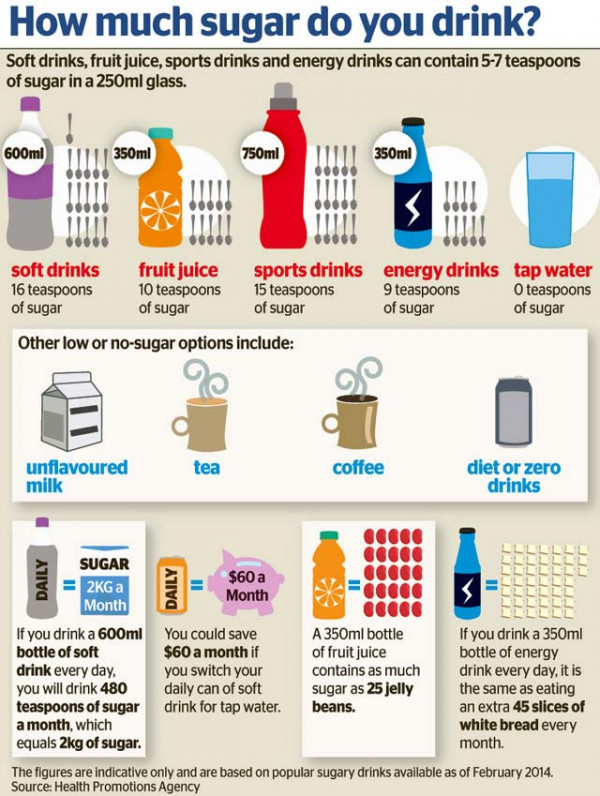
Image credit: Health Promotions Agency
People who need to boost their energy or nutrition intake can double up by choosing nutritional drinks like milk, nourishing soups, broths or milkshakes.
Read more about drinks for kids.
When you don't have enough fluid, you get dehydrated. Dehydration can be caused by drinking less water or losing more fluids.
You get symptoms of dehydration when you have lost between 1 and 5% of body water. You may experience:
- thirst
- vague discomfort
- lessened movement
- loss of appetite
- flushed skin
- impatience
- increased pulse rate
- nausea.
When you lose even more fluid, symptoms include dizziness and headache, difficulty breathing and problems swallowing. Eventually dehydration can kill.
Read more about dehydration in adults and dehydration in children.
Several factors increase the risk of ongoing dehydration.
These include:
- not being good at noticing you are thirsty
- not liking the taste of water
- drinking a lot of caffeine and alcohol
- environmental conditions, such as heat
- exercise.
Long-term mild dehydration and poor fluid intake lead to an increased risk of:
- kidney stones
- urinary tract cancers
- some colon cancers
- heart valve disorder
- diminished physical and mental performance.
You can have too much water as well as too little, and both can threaten life. However it's unusual to have too much water in your body. This is because your kidneys are very good at getting rid of the water before it can be absorbed.
When you drink more water that you need, your body's cells swell, the thirst message is switched off and your kidneys release pee.
Eating and Activity Guidelines for New Zealand Adults(external link) Health New Zealand | Te Whatu Ora, 2020
Resources
Water is the best choice(external link) Health Promotion Agency, NZ, 2020
Choose Water as a Drink(external link) NSW Government, Australia, 2021 English(external link), Arabic(external link), Bengali(external link), Chinese (simplified)(external link), Chinese (traditional)(external link), Dari(external link), Hindi(external link), Korean(external link), Mongolian [PDF, 128 KB], Nepalese(external link), Persian(external link), Tamil(external link)
How much sugar is in your drink?(external link) Health Promotion Agency, NZ, 2022
Guide to becoming a water and plain milk only school(external link) Health Promotion Agency, NZ, 2017
Preventing dehydration in unwell children [PDF, 192 KB] Healthify He Puna Waiora, NZ, 2022
References
- Nutrient reference values for Australia and New Zealand – water(external link) Australian Govt & Ministry of Health, NZ, 2014
- Jéquier E, Constant F. Water as an essential nutrient – the physiological basis of hydration(external link) Eur J Clin Nutr. 2010;64:115–123.
Brochures
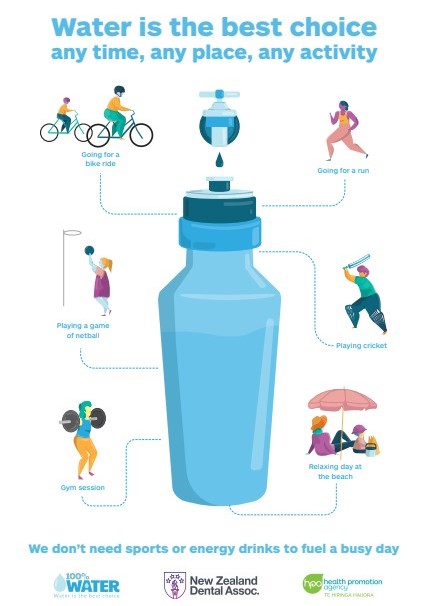
Health Promotion Agency, NZ, 2020
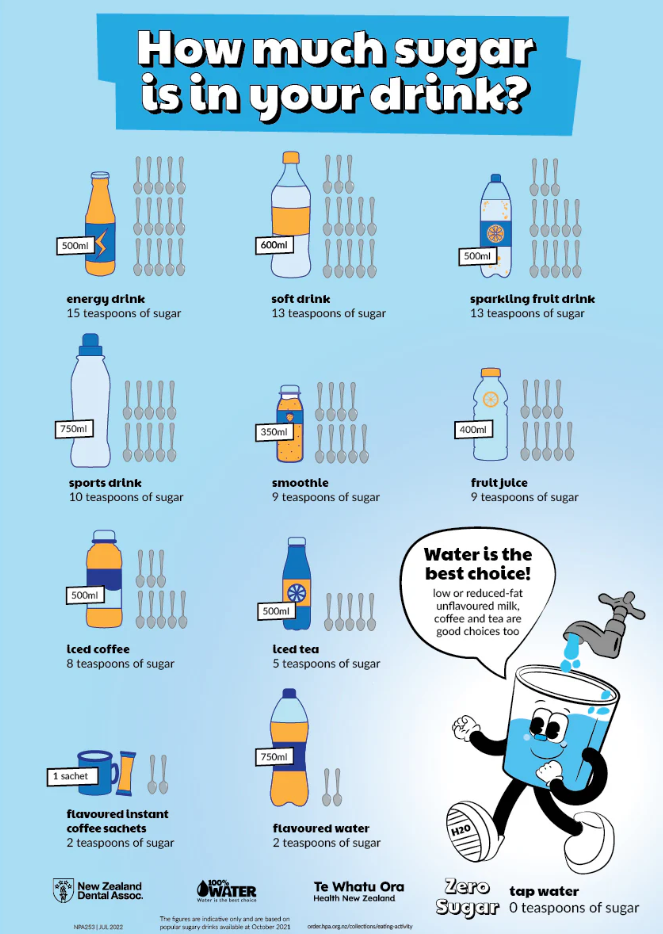
Health New Zealand | Te Whatu Ora NZ, 2022
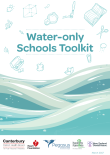
Health Promotion Agency, NZ, 2017
Credits: Healthify Editorial Team. Healthify is brought to you by Health Navigator Charitable Trust.
Reviewed by: Katrina Pace, MSc Human Nutrition
Last reviewed:
Page last updated:





